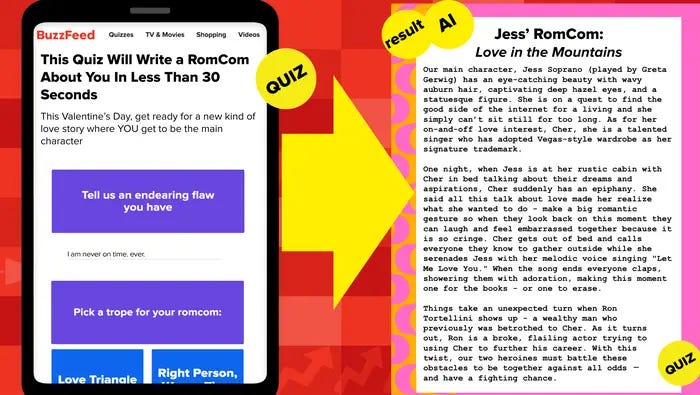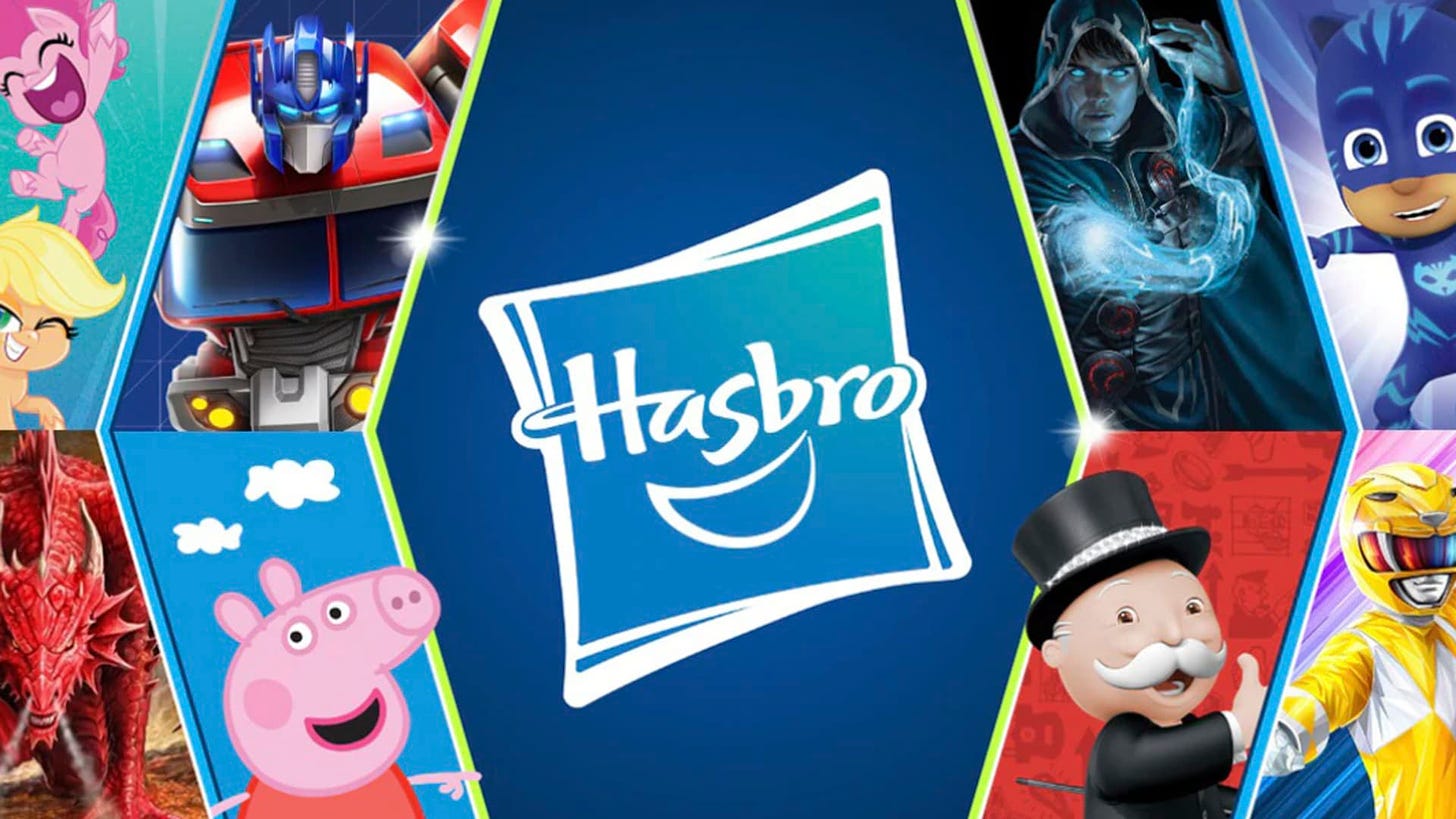Stuff Worth Knowing for the Week of January 23, 2023
The Justice Department sues Google again, AI treads through troubled waters, and one actress causes an Oscar controversy.
Welcome back to Stuff Worth Knowing! Each week, I'll round up news related to tech, video games, film, television, anime, and more. At the end of each newsletter, there will be a section called On My Mind, which includes smaller stories or quotes that I’m thinking about. You can also check out my Patreon, SavePhile, where my more thoughtful musings on any topic will go.
We didn't get through the week with no layoffs, but there were fewer compared to last week's newsletter. I guess that's… progress?
Video Games 🎮
Riot Confident No Player Data Was Compromised In Cyber Attack
Last week, Riot Games confirmed that its systems were compromised in a cyber attack. At the time, the company stated that no player data had been involved in the attack. Riot explained that it was pending further investigation on the matter.
This week, Riot Games offered more information on the hack. Apparently, the hacker took source code related to League of Legends, Teamfight Tactics, and an older anticheat platform. Riot said there's been a ransom for the stolen data, but it still contends that no player data was taken.
"While this attack disrupted our build environment and could cause issues in the future, most importantly we remain confident that no player data or player personal information was compromised," the company stated. Riot said it would release a full report on the attack in the future.
Why It's Worth Knowing: Stolen source code is bad, bad news, especially for online service games like League of Legends and Teamfight Tactics. With that source code, hackers can prepare more robust cheats or create other problems. The company has to improve its information security and hope it can blunt the issues related to any potential release of the source code.
Naughty Dog's Druckmann Says Studio Is "Moving On" From Uncharted
If you've been waiting for more of the Uncharted series, it's time to snuff out the tiny fire in your heart. In an interview with BuzzFeed, Naughty Dog creative director Neil Druckmann said that the studio feels that particular franchise is done. "For us, Uncharted was insanely successful — Uncharted 4 was one of our best selling games — and we're able to put our final brushstroke on that story and say that we're done. We're moving on," he told them.
What about The Last of Us, however? With the HBO show catching rave reviews, great viewership numbers, and a second season, surely there will be The Last of Us Part III? Druckmann said it's only a possibility if the right story comes to the team.
"Our process is the same thing we did when we did Part II, which is if we can come up with a compelling story that has this universal message and statement about love — just like the first and second game did — then we will tell that story. If we can't come up with something, we have a very strong ending with Part II and that will be the end," he explained.
World of Warcraft Classic Co-Lead Fired For Refusing to Engage in Stack Ranking System
This is an odd one. Following a report involving information that he didn't want to be public, former World of Warcraft Classic co-lead developer Brian Birmingham revealed that he was no longer an employee of Blizzard Entertainment. His reason for leaving was a disagreement with the internal stack ranking system.
Stack ranking requires managers to rank their employees, placing some in overperforming or underperforming categories regardless of their actual work. Think of it like a grading curve for workers. In the case of Blizzard, managers had to make sure at least 5% of team members were in the lowest "Developing" category. Birmingham disagreed with moving an employee from "Successful" down to "Developing".
"I'm told the forced stack-ranking policy is a directive that came from the ABK level, ABOVE Mike Ybarra. I don't know for sure, but I suspect it's true. Everybody at Blizzard I've spoken to about this, including my direct supervisors, expressed disappointment about this policy," said Birmingham on Twitter. "The Blizzard I knew and always wanted to work for is being torn apart by the executives at ABK, and it makes me sad. I truly respect the developers I worked with at Blizzard."
Birmingham took issue with the original Bloomberg report — which I will not link here — as they did not reach out to him for comment. He also stated that he did not provide them with the email that formed the foundation of their story.
The Shout-Out: This week's People Make Games is all about the internal culture of Valve Software, which also uses the stack ranking system!
Tech ⌨️
The Justice Department Sues Google Over Advertising Antitrust
On Tuesday, the U.S. Department of Justice and eight states filed a lawsuit against Google, arguing that the company has "used anticompetitive, exclusionary, and unlawful means to eliminate or severely diminish any threat to its dominance over digital advertising technologies."
The Justice Department says Google has a monopoly in the online advertising space and it wants to force the company to sell off its ads business. It's asking the Court to "order the divestiture of, at minimum, the Google Ad Manager suite, including both [Google DoubleClick for Publishers] and Google’s ad exchange, AdX, along with any additional structural relief as needed to cure any anticompetitive harm."
Google responded by saying that the "government shouldn’t pick winners and losers in a competitive industry," in a published statement. It points to competitors like Microsoft, Amazon, and Apple as quickly growing in the market and offering their own considerable investments.
This is going to take a long time to shake out. As one example, the lawsuit that eventually led to the breakup of the Bell System was started in 1974, was mandated in 1982, and finally happened in 1984. So, a clean decade there. Also, this is the second antitrust complaint against Google, with the Justice Department having filed another in 2020.
The Supreme Court Dodges Social Media Case Decisions
On Monday, the Supreme Court punted two cases toward the White House rather than making a decision on them. The cases are from Florida and Texas, whose conservative legislators drafted state laws that would force social media companies to not moderate speech on their platforms. The Florida law would impose steep fines if companies didn't allow all speech on their platform, while Texas law would prevent those same companies from removing posts based on stated viewpoints, which is… rather broad.
Rather than deal with either case, the Washington Post reports that the court asked the Biden administration where it falls on both matters. The cases themselves are already challenged in court by NetChoice and the Computer & Communications Industry Association, both trade groups that represent many of the companies that could be impacted by the laws, including Meta, Google, Twitter, TikTok, Pinterest, and more.
That's not the only case on the Supreme Court's desk that involves social media. Gonzalez v Google is all about Section 230 of the Communications Decency Act, which protects these online services from liability for what users post. According to Axios, the plaintiffs are suing Google because the YouTube algorithm recommended videos inciting violence, which they say then led to an ISIS attack.
Why It's Worth Knowing: Social media moderation has been mostly hands-off in terms of governmental control. Section 230 has protected Twitter, Facebook, and others from big consequences over the content they allow to live and thrive on their platforms. All three of these cases could change how social media operates globally. (Though Facebook has tried to pull out of countries over laws it did not like, so it likely would do the same in states.)
Of course, the inciting incident in two of the cases — former president Donald Trump's removal from Facebook — looks like it's set to be reversed soon.
Springer Nature Clarifies That AI Cannot Author Research Papers
The Springer Nature Group is one of the largest publishers of academic literature, as it owns major brands like Nature, Scientific American, BioMed Central, and SciGraph. This week, Springer laid down its rules with regards to the use of AI-generated text submitted to its publications.
"First, no [large language model] tool will be accepted as a credited author on a research paper. That is because any attribution of authorship carries with it accountability for the work, and AI tools cannot take such responsibility," said the Nature Editorial team, speaking for all Springer Nature journals.
"Second, researchers using LLM tools should document this use in the methods or acknowledgements sections. If a paper does not include these sections, the introduction or another appropriate section can be used to document the use of the LLM."
That's a pretty even-handed approach, acknowledging that AI can be helpful in the writing or research process, but disallowing anything further, like ChatGPT writing an entire article. The latter is a problem because…
CNET Acknowledges That AI Writing Is Full Of Mistakes
Last week I noted that CNET was already moving ahead in terms of AI content, letting AI write a series of explainers on its site. In an editorial published this week, CNET editor-in-chief Connie Guglielmo defended the work of the outlet's internally-designed AI engine. Guglielmo said that 77 stories were published with the tool.
Unfortunately for CNET, many of those stories were full of errors, because the AI doesn't actually understand the content it's creating. "After one of the AI-assisted stories was cited, rightly, for factual errors, the CNET Money editorial team did a full audit," said Guglielmo. "We identified additional stories that required correction, with a small number requiring substantial correction and several stories with minor issues such as incomplete company names, transposed numbers or language that our senior editors viewed as vague."
In the face of these errors, CNET is going back to the drawing board. "We've paused and will restart using the AI tool when we feel confident the tool and our editorial processes will prevent both human and AI errors," said Guglielmo.
BuzzFeed Turns Toward AI To "Personalize" Its Content
In contrast, BuzzFeed is moving full speed ahead with its own AI content. In a memo this week, BuzzFeed founder and CEO Jonah Peretti said that AI is a key part of the site's future. He stated that the site will begin using AI to craft personalized quizzes and other content.
"Our work in AI-powered creativity is also off to a good start, and in 2023, you’ll see AI inspired content move from an R&D stage to part of our core business, enhancing the quiz experience, informing our brainstorming, and personalizing our content for our audience," Peretti said.
It's worth highlighting that this news follows Buzzfeed laying off 12% of its employees in December.
Amazon Announces $5 Monthly Subscription For Prescription Medication
Amazon is not leaving any market untouched. The company launched Amazon Pharmacy in 2020, shipping generic medications to users at purportedly-discounted prices. This week, Amazon announced the RXPass, a $5 per month subscription service that offers over 50 generic drugs. The RxPass is an add-on to existing Prime memberships and includes the cost of those drugs and free shipping.
“We are excited to offer our customers surprisingly simple, low pricing on the eligible medications they need each month," said John Love, vice president of Amazon Pharmacy.
Why It's Worth Knowing: In the grim darkness of the far future, all things will be subscriptions. Amazon is relatively new to the pharmacy game and the company is making further moves into the healthcare industry. It purchased primary care provider One Medical last year for $3.9 billion. It followed that by launching Amazon Clinic, a telehealth service, in November. Amazon is slowly, but surely getting into health care, but it remains to be seen how much it can do within the industry.
The Shout-Out: Wired talked with healthcare experts about their worries in regards to Amazon's slow march into the industry. It's grim indeed!
This Week In Twitter: Twitter Throws Moderation Out The Window
Twitter owner Elon Musk started the week off in court, trying to defend himself from accusations that some of his past tweets were market manipulation of Tesla's stock. On Twitter's side, Reuters reported that advertising spend on Twitter dropped by 71% in December, which seems bad. That's probably why Musk is promising a higher-priced Twitter Blue subscription with no ads, as subscription revenue is probably the best revenue he can get his hands on.
Last week, Twitter changed its API rules, locking out third-party Twitter clients. In response, some of the companies behind those clients have launched new apps on Mastodon. TapBots, the company behind TweetBot, launched Ivory, while the developer behind Fenix launched Wooly. It remains to be seen if these apps will help Mastodon the same way they did during the rise of Twitter, but competition is good.
Internationally, it's all bad news for Twitter. In a "let them fight" moment, The Crown Estate has sued Twitter for not paying rent on its London headquarters. The Estate basically keeps track of all property owned by Charles III, the current King of England, so that seems like Musk getting in hot water. In Germany, a lawsuit was filed by HateAid and the European Union of Jewish Students (EUJS), stating that Twitter was not doing enough to combat antisemitic content and Holocaust denial. According to TechCrunch, the suit states that despite this content being against Twitter's own rules, no action is taken to remove it. (Probably because there's no one to take care of it left at Twitter…)
One would think this would perhaps make Twitter more vigilant, but instead the company said that it will take "less severe actions" against those who break the rules on the platform. Instead, it wants to shadowban violating tweets, saving account suspension for "ongoing, repeat violations." Surprising, Musk does not seem to realize his moderation policies are directly related to advertising revenue. That's probably because he has a new crony within Trust & Safety who will enact his policies without question.
Film, Television, and Streaming 🎞️
Andrea Riseborough's Best Actress Nomination Causes Oscar Furor
Earlier this week, the Academy of Motion Picture Arts and Sciences released the nominations for the 95th Academy Awards. There were expected nominations, like Daniel Kwan and Daniel Scheinert for Everything Everywhere All At Once, and some surprises, like Top Gun: Maverick getting nominated for Best Picture. (But not Best Cinematography? What?) Top of the list in terms of surprises was Andrea Riseborough getting a nomination for Best Actress for the film To Leslie.
This was surprising because To Leslie made no noticeable impact. It made $27,000 at the box office following a premiere at SXSW. Generally, the films and talent nominated are put up for nomination by distributors and production companies, who then spend a good deal of money promoting those potential nominees. This is why you will occasionally see "For Your Consideration" advertisements on Variety or The Hollywood Reporter; those are meant for Academy voters.
What happened in this case is Riseborough took her Oscar campaign into her own hands. She and director Michael Morris pushed the film in Academy screenings, and then she turned to friends like Charlize Theron, Gwyneth Paltrow, Courtney Cox, Edward Norton, Jennifer Aniston, and Minnie Driver to promote the screenings. There were also campaigns involving those actresses and many more on social media.
The push worked, something that surprised Riseborough herself. "I’m not entirely sure how the f*ck this happened," she told Deadline. "After SXSW there was a quiet lull. And then slowly, as the film had a few screenings elsewhere — including at Raindance, which was a big deal because we hadn’t had a release in the UK — we found people were starting to talk about it."
Of course, there has been some anger about Riseborough's inclusion. There can only be five nominees for Best Actress and many expected Viola Davis to get in for The Woman King or Danielle Deadwyler to be nominated for Till. There have been questions about whether Riseborough's nomination was for the craft, or just because she had a host of powerful friends.
The Academy is taking a look at its campaign procedures following the nomination and controversy. "We are conducting a review of the campaign procedures around this year’s nominees, to ensure that no guidelines were violated, and to inform us whether changes to the guidelines may be needed in a new era of social media and digital communication," said the company in a statement obtained by Deadline.
Why It's Worth Knowing: Part of the Academy Awards is a popularity contest already. This nomination just puts that into sharper relief. I doubt they'll do anything to Riseborough herself, as her actions seem largely within the rules, but they will have to contend with campaigns like this in the future. And god forbid if she wins an award that largely seems to be going to Michelle Yeoh.
Amazon Is Making a Tomb Raider Series With Phoebe Waller-Bridge
Everything starts to become a little clearer with a little more information. On Friday, Amazon announced that it's producing a television series based on Crystal Dynamics' Tomb Raider games. Phoebe Waller-Bridge will write scripts for the series as a part of her ongoing production deal with Amazon. She will also executive produce the series according to the Hollywood Reporter.
Why It's Worth Knowing: This announcement shines a bit of light on why Amazon is partnering with Crystal Dynamics on its upcoming Tomb Raider game. According to Deadline, Amazon is planning the show as "part of a Tomb Raider multi-platform universe." The show and the game will be under the Amazon banner, with the ability to expand into further multimedia projects.
Crystal Dynamics gets Amazon resources, while Amazon gets to bring a potentially-lucrative property under its umbrella. Unfortunately, it doesn't have control over everything, as rights holder Legendary has a Tomb Raider anime in the works over at Netflix.
Amazon has a few of these deals in the works. It picked up the rights for Warhammer 40K from Games Workshop, with the ability to make films, television shows, and animated projects in the universe. The Without Remorse film failed to make a mark and Jack Ryan is going to end with Season 4, but Amazon has more Tom Clancy projects in the works: a Rainbow Six film from John Wick director Chad Stahelski was announced last week and a potential Jack Ryan spin-off is in the early stages.
Amazon Signs Critical Role To TV and First-Look Film Deal
Critical Role just rolled a natural 20 once again. (I do not play tabletop. Is this a thing people say?) Amazon announced on Wednesday that it has signed a multiyear exclusive overall television and first-look film deal with Critical Role, the company who runs all those liveplay TTRPG games everyone seems to love. The first animated adaptation of the Critical Role show, The Legend of Vox Machina, was a big winner for Amazon and its second season premiered last week.
“With the success of our animated series The Legend of Vox Machina, we are looking forward to continuing our relationship with Critical Role and expanding its universe with Mighty Nein,” said Vernon Sanders, head of global television, Amazon Studios in a press release via Deadline. “Expanding these iconic franchises for our global Prime Video customers continues to be an ambitious and rewarding journey and we are eager to see where this new series takes us.”
The first series coming from the new deal will be the aforementioned Mighty Nein, based on Critical Role's second campaign. The Legend of Vox Machina animation studio Titmouse will handle this new series as well. The Critical Role team will produce through its production banner, Metapigeon. Season three of Vox Machina was already confirmed.
Why It's Worth Knowing: I don't follow it, but Critical Role is absolutely huge and it's the standard bearer of these liveplay TTRPG shows. Amazon needs properties to bring people into Prime and looking toward spaces like those inhabited by Critical Role might be another pool of stories to work with. Right now, the only recipient of that good fortune is Critical Role, but perhaps it could expand to others in the future.
Layoffs 👷
Hasbro Lays Off 15% Of Its Workforce
Ahead of its full-year 2022 financial reports, Hasbro has announced that it will be laying off 1,000 employees, or roughly 15% of its current workforce. Like many of the others in last week's layoff spree, Hasbro pointed to an underperforming business as the reason for the cuts.
"Despite strong growth in Wizards of the Coast and Digital Gaming, Hasbro Pulse, and our licensing business, our Consumer Products business underperformed in the fourth quarter against the backdrop of a challenging holiday consumer environment," said Hasbro chief executive officer Chris Cocks. "We are focused on implementing transformational changes aimed at substantially reducing costs and increasing our growth rates and profitability."
Hasbro offered up preliminary results for the fourth quarter of 2022 and the full year of 2022. For the full year, Hasbro is estimating $5.86 billion in revenue, down only 9% from the previous year. It also looks to make a profit, despite an operating loss in the fourth quarter.
At least these layoffs are including at least one executive, as president and chief operating officer Eric Nyman is departing the company.
Spotify Cuts 6% of Its Workforce
Spotify has been growing its podcasting network, but it has decided to shrink its workforce alongside that. In a memo to employees, Spotify CEO Daniel Ek announced that the company was laying off 6% percent of its current workforce. Given previous statements, that's around 588 employees.
"Like many other leaders, I hoped to sustain the strong tailwinds from the pandemic and believed that our broad global business and lower risk to the impact of a slowdown in ads would insulate us. In hindsight, I was too ambitious in investing ahead of our revenue growth. And for this reason, today, we are reducing our employee base by about 6% across the company. I take full accountability for the moves that got us here today," said Ek.
According to Ek, the company's operating expenses outpaced revenue growth in 2022 by two times. That's believable, as according to the company's third quarter 2022 earnings report, the company had a net loss of €160 million ($174 million). This is despite revenue growth to €8.6 billion ($9.3 billion), up over €1.5 billion year-over-year. A lot of the loss looks to be related to huge growth in marketing and R&D spend year-over-year, not necessarily general costs related to employees.
It's notable that the executive behind many of the huge deals Spotify has made over the past few years is going as well. "As a part of this change, Dawn Ostroff has decided to depart Spotify. Dawn has made a tremendous mark not only on Spotify, but on the audio industry overall. These investments in audio offered new opportunities for music and podcast creators and also drove new interest in the potential of Spotify’s audio advertising," Ek added.
The Washington Post Lays Off 20 Employees
This week kicked off with the Washington Post laying off 20 staffers. The cuts also come with a hiring freeze, as the Post is keeping 30 vacancies unfilled. The Post is shelving Launcher, the video game and esports-focused vertical it launched in 2019, alongside KidsPost, a news section aimed at children. Both were aimed at younger audiences, an area it seems the Post has decided is not worth pursuing. Instead, WaPo has hired more opinion editorial staffers and announced a new vertical based on "the future".
It's a shame because those employees are now without work, but also because Launcher was doing fantastic coverage of video games in a mainstream outlet. Sadly, the team behind the work is now much smaller.
On My Mind 🧠
Goldman Sachs Says Most Economies Will Avoid Recession: So, a bunch of companies did massive layoffs because of economic uncertainty in the face of a potential recession, right? Well, according to Goldman Sachs chief economist Jan Hatzius in an interview with CNN Business, the recessions aren't coming.
We don't expect a recession. Our baseline view is that we're going through a period of below-trend growth. While below-trend growth is likely to continue through 2023, we don't think it's going to be negative growth.
This sentiment was mirrored in a note from Hatzius obtained by CNBC contributor James Pethokoukis:
All major economies (except the UK) now look likely to avoid recession this year.
So, are we reversing those layoffs then?
NBCUniversal's CEO Thinks The Ad Market Bottomed Out in 2022: One of the things that's hitting many companies very hard is a free fall in the advertising market. If your business was based around ad sales, things got really tough in 2022. During Comcast's fourth quarter 2022 earnings call, NBCUniversal CEO Jeff Shell noted the difficult market, but thinks it's improving slightly. He also points to something I've been saying, in that the instability isn't because of actual market conditions, but because of the worry about market conditions. The quotes below are from a Seeking Alpha transcript of the call.
So on the ad market, I think in prior calls, the market -- the ad market steadily worsened over the course of last year. It kind of feels like it bottomed out around late November, early December. And really since then, it hasn't gotten worse and maybe even a little bit better. I describe it really as shallow.
There's parts of the market that are actually doing really well, Pharma, entertainment. Travel is on fire. There's parts of the market that feel uncertain, tech, auto, financial services, all are weak. It feels like the weakness is due less to businesses not doing well and more to just macro uncertainty. I mean none of us really know where the economy is headed, and I think some advertisers in those segments are really holding back. And when they do advertise, they're coming in later than usual.
Wizards of the Coast Relents Entirely, Putting Dungeons & Dragons Under Creative Commons: Two weeks ago, I covered the furor over changes to Dungeons & Dragons' Open Gaming License, which allowed players to use the ruleset in a variety of different ways. D&D owner Wizards of the Coast backed away from their original plans, but wanted to still move forward with a new version of the OGL. This week, they relented entirely, leaving the original OGL in place and moving the System Reference Document v5.1 into Creative Commons.
According to D&D executive producer Kyle Brink in a post on the D&D Beyond forums, this decision is final:
This Creative Commons license makes the content freely available for any use. We don't control that license and cannot alter or revoke it. It's open and irrevocable in a way that doesn't require you to take our word for it. And its openness means there's no need for a VTT policy. Placing the SRD under a Creative Commons license is a one-way door. There's no going back.
Our goal here is to deliver on what you wanted.
We'll keep talking with you about how we can better support our players and creators. Thanks as always for continuing to share your thoughts.
Strong, strong backpedal there.
The Day Before Developer Somehow Loses the Trademark To Its Game: Some folks were counting the days until March 1, 2023, when developer Fntastic was going to release the survival-shooter The Day Before. This week, Fntastic announced a delay, pushing the game back to November 10. The reason? Apparently it lost the trademark to the name.
After the announcement of the game, the above mentioned individual filled out an application before us to register the game trademark The Day Before in the United States.
Now we find out all the circumstances of the incident and we will definitely solve everything. We previously planned to post a lengthy gameplay video later this month, but we'll have to sort this issue out first.
Many have pointed out that they could still release the gameplay video. Fishy circumstances, indeed.











